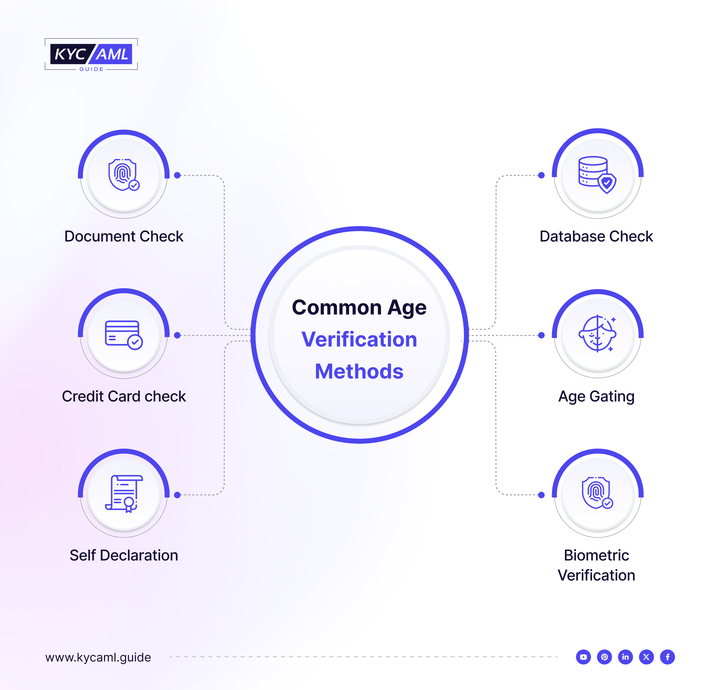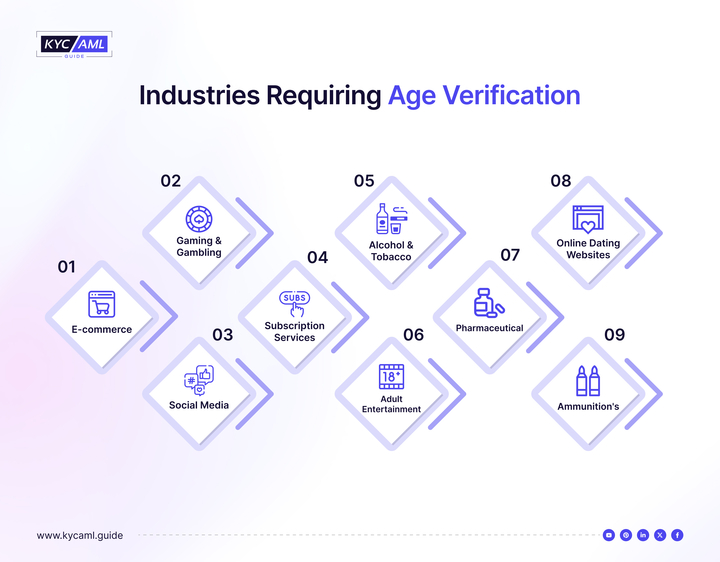Are you a company that offers age-related services or products? Or maybe you want to understand how the age verification system works. Identity verification is an integral part of Know Your Customer (KYC) or age verification as outlined in anti-money laundering laws and regulations worldwide. However, in this blog, we will explain in detail how age verification differs from identity verification.
What is Age Verification?
Age verification is the process of determining a person’s age before giving them access to age-restricted products, services, or content. Age verification methods can vary, such as a simple box where users confirm they are over 18, or more complex methods such as a video call where candidates are asked to identify themselves during the job interview. Age gating a form of age verification, is often based on information provided by the user, such as entering a date of birth or selecting a box, requiring the user to provide accurate information.
A prominent example is Louisiana’s Verification Law, which sets the standard for other states. This law requires strict age verification for online businesses, especially those dealing in age-restricted products or services.
Age verifications include various methods and technologies, such as document verification, online database, or biometric verification, to ensure that age-restricted products, services, or content are only available to appropriate adults. In general, all modern scanners rely on electronic methods that use artificial intelligence (AI) and facial recognition technology. Some of the common methods used in age verification are.

How is Age Verification Different from Identity Verification?
Age and identity verification varies depending on the system used and the level of security they provide. Identity verification involves a broad process of identifying a person’s identity, including age verification. The age verification process usually goes with the KYC process. KYC is a mandatory process in sectors such as FinTech and other regulated sectors when onboarding new customers. In these cases, determining a person’s age is only part of a broader identity verification process.
Age verification is mandatory in industries even without KYC compliance like e-commerce. This question arises when the company sells products and services that have an age effect. Although there are situations where consent is not required, it is still the company’s responsibility to communicate with age-appropriate customers. Statistics show that companies that use strong age verification technology often reduce fraud attempts. For example, a Microsoft study found that companies that implemented multi-factor authentication, a commonly used age verification process, saw a 99% reduction in takeover fraud.
Let’s consider this example
Imagine an online gaming platform with a virtual casino where users can participate in various games. To comply with legal regulations, the platform includes an age and identity verification process. Age verification occurs at the point of entry, ensuring that users are of legal gambling age before being allowed into a virtual casino. This is necessary to meet legal requirements and prevent underage individuals from participating in gambling activities.
Once inside, identity verification plays a key role. Users are asked to provide additional information such as legal name, address, and possibly photo ID to verify their identity. This comprehensive check helps the platform ensure that users are who they claim to be, preventing fraudulent activity and increasing the security of all financial transactions in virtual casinos.
Regulations for Age Verification
While age approval laws and regulations exist, it is important to note that specific procedures and guidelines may not be universally defined or clear on this point. However, companies still need to implement effective age verification systems to meet legal obligations and protect vulnerable people. Some of the age-related regulations are
- Children’s Online Privacy Protection Act (COPPA)-United States.
- EU’s Digital Services Act (DSA)
- Britain’s Online Safety Bill
- Pan-European Games Information (PEGI)- It is accepted by more than 200 companies and used by 20 of the 27 EU member states.
- Protection of Young Persons in Germany
The UN Convention on the Rights of the Child, ratified by 196 countries, sets international standards for children’s rights, including online protection and the age of consent, which are important tools for protecting these rights. Failure to comply with age verification rules can lead to significant financial penalties. For example, the UK government can impose fines of up to £18 million or 10% of their annual global turnover on companies that do not comply with the rules of age verification.
Industry-Specific Requirements
Digital transformation has completely changed business operations, opened doors to global markets, and expanded the customer base. Age verification is increasingly becoming an important pillar in securing online business and maintaining a trusted and supportive business as a part of identity verification. For businesses, especially those selling age-restricted products and services, the challenge is twofold. They will prevent inappropriate users from accessing inappropriate content or purchasing prohibited products and will ensure compliance with local and international regulations. Some of the industries that require an age verification system are given below

Some industries face unique challenges when it comes to age restrictions and ensuring compliance.
- A UK study showed that 450,000 children between the ages of 11 and 16 bet regularly.
- 37% of teens have experienced online harassment in the U.S as per teenage cyberbullying statistics
- According to the National Institute on Drug Abuse (NIDA), 5.4% of teens in 2020 used prescription drugs for nonmedical purposes.
- According to the Common Sense report, 73% of teen respondents aged 13 to 17 have watched adult content online, with more than half (54%) having seen adult content before the age of 13.
Benefits of Using Age Verification
A safer digital environment for children is created with better control of online identity, however it is an increasingly complex challenge. As adult industries move their operations online, age-appropriate barriers must remain in place without stifling business growth. Accurate age verification software can be a boon, not a burden for age-restricted businesses as it has the following benefits
1 Branding and Loyalty.
A strong age verification process helps prevent reputation mistakes and reinforces your position as a brand that takes security seriously.
2 Reducing Fraud.
Biometrics based on age verification makes AI more effective at detecting fraud and fake identities, making it easier to prevent children from trying to create unauthorized accounts.
3 Ensured Compliance.
The software makes it easy to manage and control age verification across platforms, channels, and regions, and maintain compliance as you grow online.
4 Good Sales Experience.
Age verification software can help sellers and managers quickly verify a buyer’s age and identity.
Bottom line
Finally, choosing the right age verification system isn’t just about consent; it’s about creating a safe, secure, and comfortable digital space. This is an important step in protecting the online landscape and ensuring that content and products are fairly and legally sourced. If you have a problem finding a good identity verification then the KYC AML Guide is here to help you. We are offering research-based KYC technology buying services that will help you find the best KYC solution as per your business requirements.





